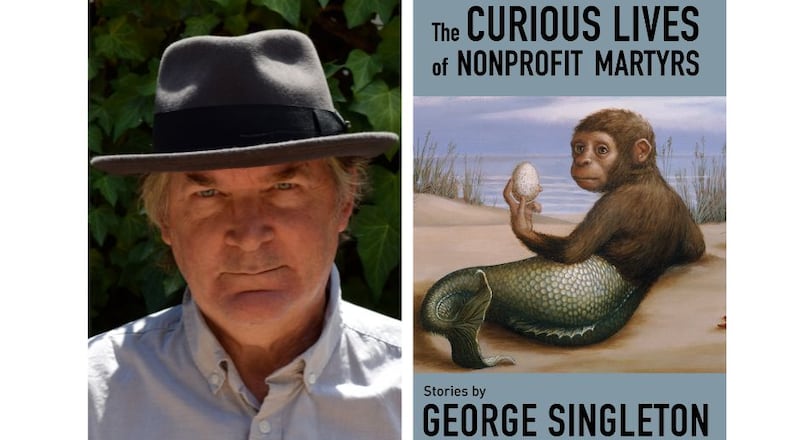What drives people to devote themselves to public service? Author George Singleton focuses his sharp wit and mastery of nuance to explore the privatizations of benevolent workers in “The Curious Lives of Nonprofit Martyrs,” a collection of stories set in small Southern towns. These 17 works of short fiction are related far more by theme than character and deliver a delightful, occasionally disturbing and unapologetically honest exploration of Southern life, while peeking into the unique personalities of those who work for social good.
Julian “Cock” Walker, one of Singleton’s few recurring characters, opens the collection in “What a Dime Costs.” Julian is 13 years old and bewildered by his parents. “My mother tried to hide her flask. Whereas my father succumbed to bourbon,” he explains to differentiate their personalities.
Julian’s father is a grifter obsessed with sneaking into pay toilets to save 10 cents. His mother floats through life in a daze that Julian’s adult self recollects as “a sadness no one deserved.” After his father disappears from a pay toilet while on a family trip to the Aiken polo field, Julian drives his intoxicated mother home as she chucks biscuits at school-crossing signs. She’s either unraveling or celebrating, adolescent Julian can’t decipher which.
The first story sets the mood for Singleton’s anthology featuring characters who exist on the fringes. Overwhelmingly, they possess an inherent dissatisfaction. They come from dysfunctional families, or their relations suffer from ailments. They shun harmful Southern stereotypes while embracing others. The ones who are most disturbed have expanded their horizons through academia and returned with a new awareness.
Stories of public-sector workers and educators are peppered with tales about the niche nonprofit world. Singleton’s organizations range from important to hilarious to odd. STITCH offers free yarn and knitting lessons to the unemployed. Providing Urban Blooms Each Spring is a gardening nonprofit known as PUBES. And a few stories concern chickens, tying in with Julian’s nickname from the first tale. For the Birds is an organization that places hens in urban communities. And in the story “Cock Rescue,” a rooster rescue organization experiences a mishap when they attract the wrong kind of customer by using Julian’s childhood moniker in their name.
The bird analogy is rich in the titular tale “The Curious Lives of Nonprofit Martyrs” and speaks to the inevitability of life. Roger, who works with For the Birds, encounters his teacher from 10th grade while contemplating the purchase of baby chicks to cheer up his mother who has Parkinson’s. They reacquaint as his mother declines, revealing another dynamic prevalent in Singleton’s stories — educated children returning to care for their ailing blue-collar parents.
Singleton’s protagonists are white men who have rejected the racist tropes they grew up with; many actively rail against them. In “Proofs of Purchase,” Quarles returns to his hometown to visit his father who is suffering from dementia and stops by a bait shop and bar at Camp Scott. Quarles runs the nonprofit Cartographers Without Borders, devoted to updating obsolete maps in rural public schools, and he hates talking politics with oppositional locals.
To his surprise, former mayor Big Ned is triggered by a fisherman’s racist bumper stickers and leaves with a gun, stating, “It’s my duty not to let that man bring up children so they end up acting just like him.” The repetitive gunshots later heard echoing between the mountains offer no answers and plenty of unease, as do inconclusive elements in many of Singleton’s stories.
In “Protecting Witnesses and Witnessing Protection,” Calvin is drying out at a cabin on the banks of the Tuskegee River when he encounters a trio of men at a different bait shop and bar who form POSSUM, People Opposed to Southern Supremacists United Militia. They warn him not to say anything liberal, believing the tackle shop is surveilled by KKK members, and want Calvin to join their cause.
Not all of Singleton’s characters play into gun tropes like Big Ned. In “Dispensers,” where adult Julian makes an appearance, he’s antiquing in Georgia and stops at a diner where he encounters members of Veterans Against Guns in North America. VAGINA is working to make America “great like it was when people didn’t kill each other at random.” The organization reappears in a few other stories, but the power of Singleton’s message isn’t conveyed through surface repetition.
Instead, he uses layers of subtlety and nuance to thread these stories together. One example that resurfaces is the reclamation of valueless items. Quarles is desperate to determine the value of the 7,000 Kraft macaroni and cheese box tops he inherited from his father. Calvin sells voodoo dolls made from dryer lint to famous celebrities for exorbitant prices, dolls that are rumored to produce Oscar wins. Julian repurposes retired school desks to fulfill a lucrative, international demand for graffiti-covered desktops featuring American slang.
Repeatedly, Singleton’s young folks seek to refurbish useless junk into something relevant and valuable. The objects themselves may inspire a giggle, but repurposing these items serves a dual narrative purpose when it becomes clear that these characters are accepting their roots while discovering the individual places they fit in the world.
As George Singleton’s characters in “The Curious Lives of Nonprofit Martyrs” meander through small towns and obscure causes and various states of melancholy, these 17 stories reveal much more than a slice of Southern life. There’s a beautiful brokenness driving these characters toward their distinctive causes that’s born from the most basic of compulsions — the human need to belong.
FICTION
“The Curious Lives of Nonprofit Martyrs”
by George Singleton
Dzanc Books
256 pages, $17.95
About the Author




